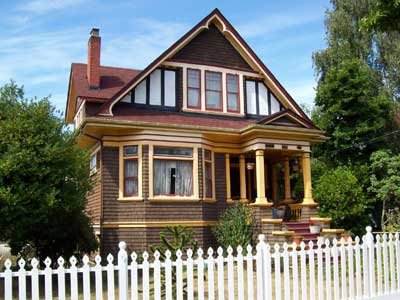ARCHITECTURE:
This 1½-storey Edwardian Vernacular Arts & Crafts house is located in a cluster of Edwardian era homes on Linden St. The front-gabled, steeply pitched roof has two brick chimneys and three gabled dormers. A large dormer faces south and a smaller pair face north. On the front façade whalebone bargeboards are decorated at the peak with a distinctive trefoil motif, which Sharp also used on his own house at 1703 Fort St (demolished 1988). The shingled gabled peak and a triple window project slightly over a pent roof. Above these windows is a tapered architrave with small brackets. Wide enclosed eaves project over a triple belt course. The house is clad in stained shingles except for a band of half timbering in the front gable. The main floor features a wide angled bay window offset by a projecting porch. The front bay consists of a larger fixed centre pane with double-hung windows on either side. All have art glass transoms. The south side features a similar projecting bay window. The pedimented porch, although an anomaly in design, shows the popularity of the Classical Revival during the Edwardian period. The porch has square posts on shingled piers and stepped stair balustrade, capped with wood except for a section of spindles between two of the posts. The recessed entry shelters a front door with an oval window and side lights. The property is fronted with an appropriate picket fence.
ORIGINAL OCCUPANTS:
This property was purchased from the Hon Peter & A.J. O’Reilly in 1905-06 by Kendrick Sharp (1869-1935; frequently misspelled as Kenneth Sharpe). Sharp was born in Huntingdonshire, England, and came to Cumberland in the Comox Valley of Vancouver Island c.1894. He designed Cumberland’s Holy Trinity Anglican Church in 1895. He also built many houses in Cumberland, including one for himself on Penrith Av. Sharp was a founding member of Comox Valley Fire Department and Cumberland Masonic Lodge No.26.
In July 1897 Sharp left for the Klondike gold rush, remaining there until c.1905. He then moved to Victoria, where he acquired extensive property in the boom years before WWI, and built many houses, particularly in the Fairfield district, including 644 and 809 Linden (Rockland), and 528 and 608 Su’it St, in that distinctive grouping of Arts & Crafts houses. Ill health forced him to travel to Australia and New Zealand for a couple of years, but he then returned to contracting in Victoria.
In 1917 Sharp was involved in arbitration with the City of Victoria in a claim for compensation because the City had altered grades on upper Pandora Av, next to a number of lots that Sharp had purchased near the Dupont Estate (Stadacona Park) in 1912. He was awarded damages and costs of $2,500. Sciatica finally forced his early retirement in 1923, and he moved into the residential Ritz Hotel at 710 Fort St. He was a member of Victoria and Columbia Lodge No.1, AF&AM, and a life member of the Pacific Club; it was at the Club’s 1935 annual dinner that he was stricken and died.
OTHER OCCUPANTS:
Janet (Strachan, 1856-1933) and Henry Ballantyne Clay (c.1852-1898) came from Ontario and established the Metropolitan Bakery & Tea Room, later Clay’s Bakery & Confectionery at 39 Fort St in 1888. It was a popular meeting place for years. The Clays originally lived on Fort St, but in 1904 Janet commissioned Francis Rattenbury to design her a house at 911 Linden Av (Rockland). But she was inveigled into investing in one of Rattenbury’s schemes, and financial loss forced her to move to the smaller house at 810 Linden, where she resided until at least 1917.
George (1856-1941) and Jane (Smailes, 1857-1947) Piercy bought this house in about 1918 and lived here until about 1940. Born in Canton, China, George had been headmaster of the Diocesan School and Orphanage in Hong Kong before he retired and came to Victoria with Jane in 1918. They were living at 424 Linden when George died, and Jane later moved to Vancouver.
Emma Christina Leitch (Brant, 1878-1951), widow of Andrew Leitch (1862-1936), lived here in the 1940s. Born in Osage, KS, to Swedish parents, Emma came to Victoria in 1893. In 1898 she married Capt Henry Crocker (c.1866-1929), and they lived in Victoria for years. She was president of the Women’s Institute, vice-president of the BC Agricultural Association and a member of the Tuberculosis Veterans’ Association. She was living in the Cowichan District when she married Andrew Leitch. Born in Scotland, Andrew was a marine engineer and a Boer War and WWI veteran. They came to Victoria shortly after their marriage, and Andrew died a few months later.

